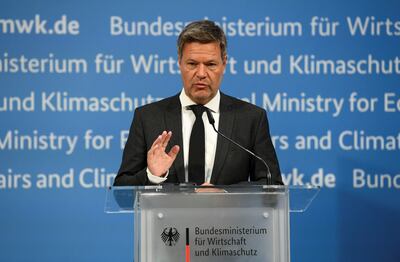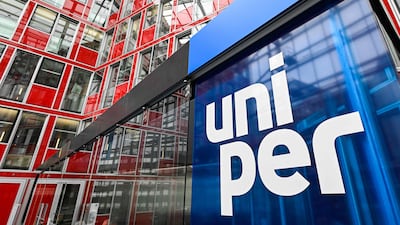Germany has announced a multibillion-euro bailout of its biggest gas supplier Uniper, bringing it under state control after it suffered heavy losses due to Russia’s pipeline closures.
The federal government will take on a 99 per cent share in Uniper and buy out its Finnish parent company Fortum, Vice Chancellor and Economy Minister Robert Habeck said on Wednesday.
The bailout is the latest step taken in Berlin to prepare Europe’s biggest economy for a difficult winter, after customers were urged to save power and emergency plans were made for energy rationing.
Uniper is Germany’s biggest gas importer but was reliant on deliveries from Russia, which slowed to a trickle over the summer and came to a complete standstill with the closure of the Nord Stream 1 pipeline this month.
The company was offered a €9 billion ($9bn) loan in July when ministers said they would take a 30 per cent stake, but Mr Habeck said the situation had become “considerably more dramatic” since.
Uniper last month reported more than €12bn of losses, saying Russia’s cuts had forced it to pay through the nose on the spot market to fulfil its contracts to hundreds of industrial customers.
“Uniper has a 50 per cent share of Russian gas in its portfolio and represents 40 per cent of German gas supply,” Mr Habeck said. "That compels us to act … to secure Germany’s energy supply."
The cost of the bailout will include €8bn to buy new shares and €480 million to take over Fortum’s stakeholding, as well as loans and guarantees inherited from the Finnish company.
Uniper’s nationalisation calls into question a gas levy set to be added to energy bills from next month to share out the cost of replacing Russian gas, a policy that led to heavy criticism of Mr Habeck.
Since Uniper would have been one of the main beneficiaries of the money raised by the levy, some MPs argued that the wider bailout had made it superfluous.

Mr Habeck, from the Green party, said it would still go ahead from October 1 because the nationalisation process would take weeks to finalise, but said officials were examining whether the levy could continue beyond that.
But he appeared to be contradicted by Finance Minister Christian Lindner, the leader of the fiscally cautious Free Democrats, who said the levy was final and that no further assessment was needed.
Uniper’s chief executive Klaus-Dieter Maubach said the bailout “allows us to continue our business and to fulfil our role as a system-critical energy supplier”.
“At Uniper, we are aware of our responsibility for Germany and Europe,” he said. "We are committed to doing our part to overcome this crisis and to restructure the energy supply in this country."
Uniper is one of the companies trying to secure alternative supplies for Germany by building a liquid natural gas terminal on the country’s North Sea coast.
It announced in May that temporary floating terminals would be ready at the port of Wilhelmshaven this winter, before more permanent structures are built by 2025.
The terminals are meant to free Germany from reliance on Russian pipelines and allow it to import gas from exporters further afield, such as the US and Qatar.


